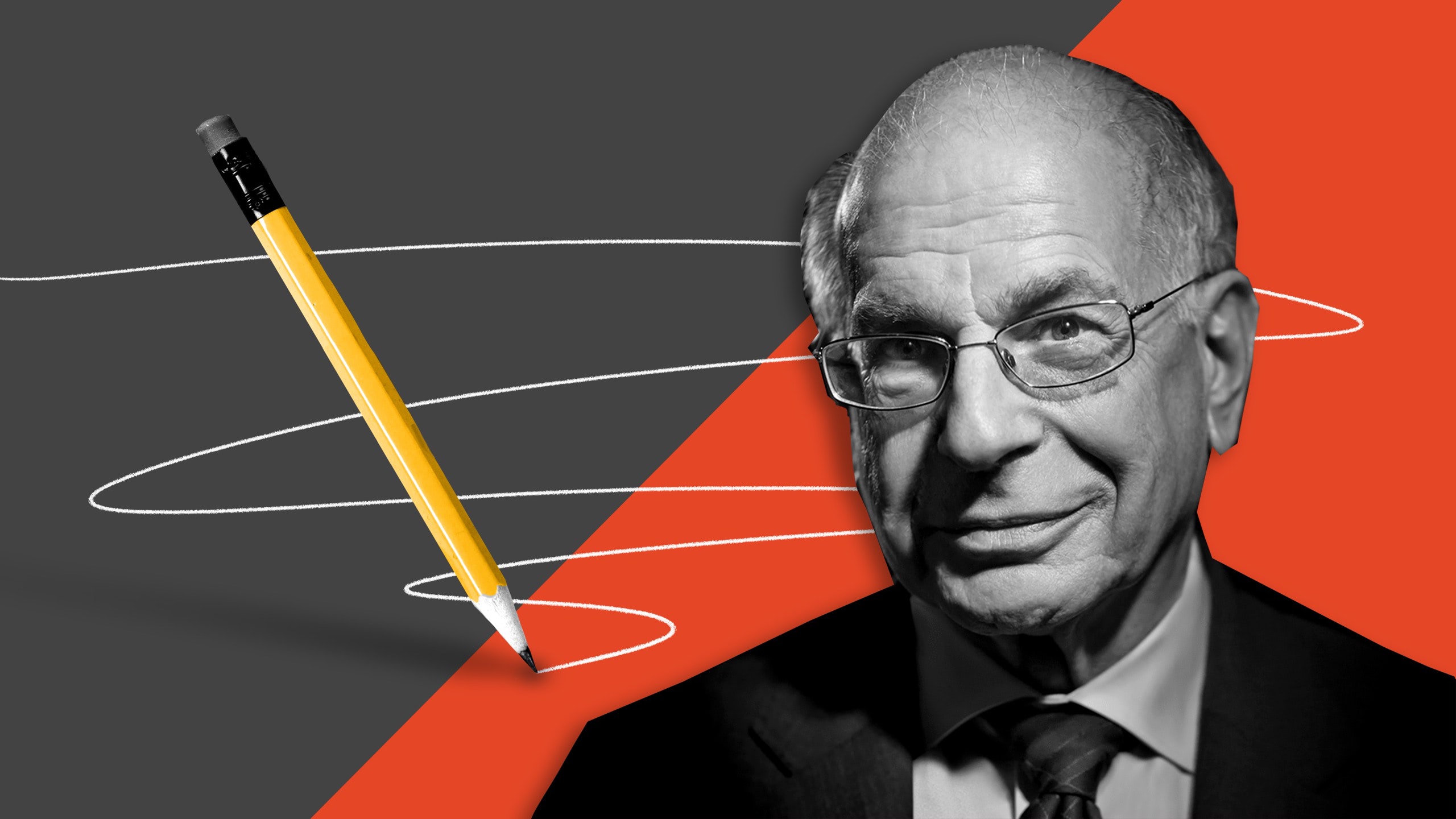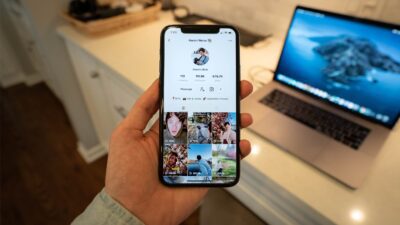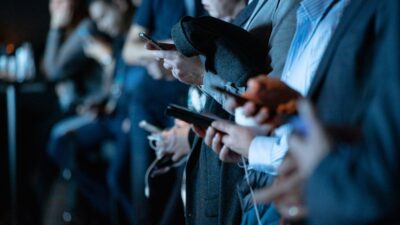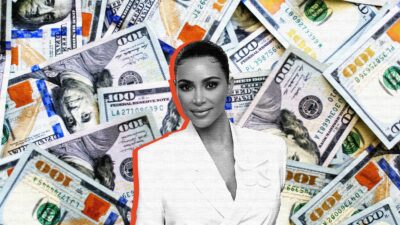Sandra Peter and Daniel Kahneman

Noise and other distractions with Daniel Kahneman
This week: a special episode with Daniel Kahneman.
Good judgment is not just an admirable personal quality, it’s a valuable life skill. Nobel Prize winner and renowned author, Professor Daniel Kahneman has spent his life exploring how people make decisions and what are the factors that lead us to make good – or bad – decisions.
This podcast is an edited highlight of a conversation with Professor Kahneman and Sandra Peter, including questions from the audience.
Sandra Peter (Sydney Business Insights) and Kai Riemer (Digital Futures Research Group) meet once a week to put their own spin on news that is impacting the future of business in The Future, This Week.
Shownotes
Our 2021 conversation with Professor Kahneman
Our 2019 interview with Professor Kahneman
Daniel Kahneman at Princeton University
The citation for Professor Kahneman’s 2002 Noble Prize in Economics
Professor Kahneman’s 2012 book Thinking, Fast and Slow
Five experts’ views on how Daniel Kahneman changed the way we think about thinking
Professor Kahneman discusses what makes people happy (or not)
The 2006 paper in which Professor Kahneman proposes the U-index, or the unhappiness or misery index
TED Talks, there’s more than 4,000 of them
Professor Kahneman and Gary Klein’s 2009 paper on intuitive expertise
Sendhil Mullainathan, Professor of Computation and Behavioural Science
Follow the show on Apple Podcasts, Spotify, Overcast, Google Podcasts, Pocket Casts or wherever you get your podcasts. You can follow Sydney Business Insights on Flipboard, LinkedIn, Twitter and WeChat to keep updated with our latest insights.
Send us your news ideas to sbi@sydney.edu.au.
Music by Cinephonix.
Dr Sandra Peter is the Director of Sydney Executive Plus at the University of Sydney Business School. Her research and practice focuses on engaging with the future in productive ways, and the impact of emerging technologies on business and society.
Daniel Kahneman is Professor of Psychology and Public Affairs Emeritus at the Princeton School of Public and International Affairs and was awarded the 2002 Nobel Prize in Economic Sciences.
Share
We believe in open and honest access to knowledge. We use a Creative Commons Attribution NoDerivatives licence for our articles and podcasts, so you can republish them for free, online or in print.
Transcript
Disclaimer We'd like to advise that the following program may contain real news, occasional philosophy, and ideas that may offend some listeners.
Daniel Kahneman The only times I feel quite certain that I've learnt something is when I look at what I used to think and I've said, "What an idiot, you know, how come I didn't see this before?". Which happens to me a lot.
Sandra That is Professor Daniel Kahneman, winner of the 2002 Nobel Prize for Economics, and widely considered the world's most influential living psychologist. His best-selling book, Thinking, Fast and Slow, is credited with changing the way we think about thinking. His latest book, Noise, together with Olivier Sibony and Cass Sunstein, looks at why people make bad judgments, especially in similar settings where judgments should be identical. Think doctors, lawyers, economic forecasters, HR staff, all making vastly different decisions, where organisations would expect consistency. This conversation with Professor Kahneman is taken from one of our recent events. My name is Sandra Peter, and this was the second time I had the pleasure of talking with Danny. I picked up our conversation where we left off previously.
Intro From The University of Sydney Business School, this is Sydney Business Insights, an initiative that explores the future of business, and you're listening to a special episode of The Future, This Week, a conversation with Professor Daniel Kahneman.
Sandra To everyone out there watching, you can still submit questions on Slido using the event code SBI2021. And many questions there already. But before going to audience questions, let me start by asking you a couple of questions. Danny, it's been two years since you and I last spoke, and it was in between the publication of Thinking, Fast and Slow, and your latest book, Noise. And in our conversation, you said something that stayed with me ever since. So I want to pick up where we left off. And we were talking, as I recall, about failure and how failures are routine in the academic work and in thinking work, yet we seldom talk about it. And you said, and I quote here, "actually, I enjoy changing my mind ... And the occasion for changing your mind is always when you find out that you've been wrong". And you said that for you this was a real joy, finding out that you've been wrong, the discovery that you've learned something new. And that's the kind of stuff that makes work interesting. But there's very little emphases in changing one's mind in general. And in politics, and in business schools in particular, there's almost a stigma attached to it, which leaves us kind of unprepared for when the world changes, or when we make research advances, and we understand things better. So I want to focus on those exciting times in your career. Can you start by talking a bit about the pleasure of changing your mind?
Daniel Kahneman Well, it sometimes drives my collaborators crazy because most of my work is collaborative. And quite often, as they all will complain, I announce that something is deeply wrong in the work that we've done. And sometimes we find a solution, sometimes even I find a solution. And those moments of even finding that I'm wrong there is some pleasure, in that there is, I feel I've learned something, I used to think something and now I think something else, and then solving it is even more fun. But even when I solve it, I know that it's temporary, that I will change my mind again. And for me, it's one of the joys of work. It's the only times that I feel quite certain that I've learned something is when I've looked at what I used to think and I've said, "What an idiot, you know, how come I didn't see this before?". Which happens to me a lot.
Sandra One area I've heard you reflect on is the study of happiness. And you're responsible for convincing basically researchers that happiness is a real experience, and it can be measured, and therefore can be studied and understood. And I dare say you've made happiness both practical and respectable. I know you've abandoned happiness as a focus, and you've stated that you're more interested in the study of misery, and you think it is more important for policies to be focused on how we reduce misery rather than improving happiness. Can you talk a little bit about happiness and how and why you've changed your mind around this?
Daniel Kahneman Well, I've changed my mind in multiple ways about happiness, because I found that actually, happiness is not what people want. What they really want is life satisfaction. That is, they want to have a good story about their life much more than they want particular experiences of happiness. So that was one reason for leaving the field. The emphasis on misery is less, you know, something about which I changed my mind, because when I was working quite early, we have something that we call the U- index, the unhappiness index, which is the time that you spent in a miserable state. And as it happens, I'm working on just that problem again right now, because somebody failed to replicate a result of ours and we've been involved in a joint collaboration trying to figure things out, and I think we have. So it's an exciting topic for me these days.
Sandra Your career has always focused on the study of judgement and decision making, and what can be broadly described as big effects. And that is to say, you've stayed fairly clear of looking at individual differences in particular. But recently, I've heard you remark on the fact that there seems to be value in studying individual differences. Can you talk a little bit about what made you rethink the need to do so, or the value that might be found there?
Daniel Kahneman Well it didn't start with individual differences, it really started with noise. And the discovery that there is just a lot of disagreement among people, when they make judgments, judgements where we'd expect them to agree and where, in a sense, every one of the people who made the judgement think they're right, and yet, they disagree a lot. So that's noise. And that's the topic of the book that we published earlier this year. Now, one of the aspects of studying noise is individual differences. Why do people differ? And there are some dimensions that we know, but my guess is that most of noise will remain unexplained. That is, that there are just differences among people, and that there's so many differences and so subtle, that we're not going to be able to explain much of the noise there is. But it's worth trying, and I'm interested in it. And it's true that I never had any interest in individual differences, so it is new for me.
Sandra And speaking of new things, you've taken us to noise so I'll pick up on a couple of the audience questions here: where does noise matter in general, but where does it matter most?
Daniel Kahneman Well, it matters in socially important decisions. So in general, we have organisations, and it's the organisation that speaks. So if you have an insurance company, and you have underwriters setting premiums for policy, they speak for the organisation. When you have judges setting sentences, they speak for the justice system. And there is something really unfair and clearly undesirable when an organisation does not speak in one voice. And that's noise. Where it's most important, clearly in the domain of justice and sentencing, obviously, we don't want noise. In the domain of medicine, obviously, we don't want noise, and yet we find a lot of it. And I think that noise is a problem for many organisations which produce judgments. You know, it's true for insurance companies, it's true for banks, it's true for lenders, it's true for investors, and each of these organisations has individuals who make particular decisions on its behalf. And if these individuals typically do not agree with each other, then the organisation has a problem. But where it's most important is on vital decisions, like how many years will somebody spend in prison? Or what is the proper treatment for a particular disease for a particular patient?
Sandra Picking up on some more audience questions: how should organisations, how should individuals, deal with noise?
Daniel Kahneman Well, well, I'm hesitating because essentially, read our book. We spend a lot of time in our book on, it's actually a much more prescriptive book than Thinking, Fast and Slow was, in that because it is addressed to organisation, I'm more optimistic about the possibilities of organisations improving their decision making. So we have some recommendations for what we call 'decision hygiene'. And well, when you have biases, and we talk about reducing biases, it's like a disease. And treating a disease, you do that with vaccines, or you do that with medications, but they're specific to the disease. And what is the contrast between that and hygiene is that when you're washing your hands, you don't know what germs you're killing, and if you're lucky, you'll never know. And so there are procedures of how to make good judgments and how to make better decisions, not good, but better judgments, better decisions. And we know quite a bit about that. Not enough to guarantee that good decisions would be made. But there are several steps that can be taken at breaking up problems, making judgments relative, aggregating judgments, keeping judgments independent of each other statistically. So there are many steps decision hygiene can be worked out in some detail.
Sandra Maria's asking if there's a place where we want noise, where noise is a good thing, where we might want individual differences?
Daniel Kahneman Well, you know, our definition of noise is that it's variability that you don't want. So by definition, noise is bad. But variability is often very good. And so, clearly, you want a lot of variability when there is a possibility for selection. So the engine of, of evolution is noise. So there is variability in that the fittest gets selected. And then variability in many contexts is the spice of life, you don't really want, you know, all your film critics to agree with each other, you don't want all the participants in a discussion to agree with each other. So there are many situations where we actually want variability. We want variability in the context of creativity of looking for solutions. But there are contexts where we don't have variability. And that's where we call variability noise. And we think it should be reduced.
Sandra We've spoken a bit about definitions here, and when we want certain things and when we don't. I want to take you to social psychology a bit, and the fact that in quite a few fields we're discovering that a lot of what we've taken for granted, and I'm talking here, especially about these very sexy theories and findings, it's not quite as we thought, so weaker effects, and sometimes not quite replicable, maybe even false. And you've shown very early concerns with some of the results in social psychology, especially priming studies, studies that show that there are dramatic influences of minor, kind of irrelevant, aspects of a situation. And you wrote a letter to your colleagues almost a decade ago in which you warned of a 'looming train wreck'. And that train wreck was the crisis of replication in social psychology, and that has since spread to other disciplines as well. Can you talk a little bit about what this crisis meant for the field? And where do you think we are today?
Daniel Kahneman Well, the crisis meant very different things for people in different areas. The most important thing that I think has happened is that there has been almost a revolution in psychology. And it's happened incredibly fast, in terms of improving the methodology of research. So a lot of procedures have been introduced within the last eight years that change the way that people do research. And you know, I can feel it myself. When we're involved in research we're thinking ahead, we're pre-registering our research, we are computing power, we are really being very careful about specifying our methods. So when you look at the replication crisis, the main thing that stands out eight years later, is what a huge benefit this has been for the science. And psychology is just a much better field now than it was 10 years ago. And this is because of that trainwreck, actually.
Sandra Speaking of the train wreck, I want to hear a bit about how we retire ideas out there. So how do we unlearn some of the stuff that's out there? Because many of these ideas, and social psychology ideas are a prime example, many of them are still out in TED Talks, in thought leadership pieces and the like. And many policymakers and managers still rely on them. And they're still quite ingrained in public consciousness. I'm also going to attach Leanne's question here, which says that these things live on in businesses, how do we retire them? And what are our responsibilities also as academics around that?
Daniel Kahneman I mean, you know, we have no solution to this problem. Except textbooks should adapt and I'm sure that they are adapting. The problem, actually, with the sexy findings that have proved non-replicable is that there is limited appeal to books that say that something isn't true. Especially if something exciting that you wanted to believe in is not true. That is not news that there is a lot of demand for.
Sandra 'Chicken soup is not really good for depression' is not a catchy title.
Daniel Kahneman Yeah, that's right. So you're asking what can we do to retire ideas? I have no idea. You know, let's hope that there are better ideas that come up and capture the imagination of people. But otherwise, I think you need some texts that are widely read and that will correct some of the mistakes that were made. For example, Thinking, Fast and Slow, has a chapter on priming, which, you know, I wish I hadn't written. And somebody will write a better book, and that will be new, and things will be corrected. But you'll have to wait until there is a replacement for those sexy findings. Because people want to believe that.
Sandra Your work has gone a really long way to say that we need to, kind of, unlearn the common-sense way in which we rely on intuition, which is this automatic, unexamined way. And there have been quite a few questions around intuition coming in on Slido as well, people saying, you know, they rely on intuition, how can we avoid this? But then why is intuition so seductive? And how should we think of intuition?
Daniel Kahneman Well, you know, intuition is sometimes defined, and which just seems crazy to me, but it's sometimes defined as 'knowing, without knowing how you know'. But it's not knowing really, it's feeling that you know something without knowing why you feel that you know. When you say that it's knowing, you're assuming that it's true. And what is really the case is that intuition is a strong feeling that something is true. And it's a difficulty in imagining any alternative. So it comes with high confidence. Now, I really want to stress that most of the time, we act on intuition. So you know, in terms of fast thinking and slow thinking, most of the time, we are in fast thinking mode, and most of the time, it works extremely well. When it comes to more complex problems, there are situations in which even in complex problems expert intuitions can be trusted. You know, one of my friends and collaborators is Gary Klein, whose line is he believes in intuitive expertise or in expert intuition. And he's written very eloquently about it. And in fact, he really doesn't like any of the work that I have done that pushes against it, but he and I agreed on the conditions under which there is expertise, intuitive expertise, and on the conditions under which you should rely on your expertise. And you know, there's three conditions: the world has to be regular; you have to have had a lot of practice, and the practice must have involved fairly rapid feedback. If those three conditions are satisfied in a particular domain, intuitions in that domain are likely to develop and to be valid. If they're not satisfied, any of those is enough for intuition not to be expert intuition. People will still have them; people have intuitions about which stocks will go up or down in the stock market. And they shouldn't, but because the stock market is not regular. So it's a nuanced message, it's not that, you know, you want to resist intuition wherever, you want to be suspicious of it in a certain class of problems. And organisations have an opportunity to resist intuitions because organisations really are slow cranking, relatively. And so they can question intuition. And individuals can question intuitions under some conditions, where they know, or should know, that they're susceptible to illusions, to conjure illusions or to emotional illusions, then they should slow down and get advice, slow down, and think. I was very careful actually in writing, Thinking, Fast and Slow not to speak against intuition. I said it's marvellous, and it's flawed, and we should know when it's marvellous and when it's flawed.
Sandra So the best way to think about intuition, to sleep on it, wait a bit?
Daniel Kahneman Ah well, it depends what. On simple problems, where you have a lot of experience, just trust it, like which we do anyway. When the stakes are high, and when you look at it, you see that the conditions for confidence are not there, that actually you don't have evidence for what you feel is true. And it's important, say, slow down, you know sleep on it, sleeping on it may not be enough, get advice, and take it slowly.
Sandra John's asking what intrigues you most, what's the most important thing you've learned over the last couple of years? And I think he's reflecting on since pandemic times rather than since last you and I spoke.
Daniel Kahneman That's a hard question because my memory doesn't work very well, and it doesn't work that way. So yeah, I won't be able to think of a fact that I have learned, you know, that I would consider the most important. Clearly there are really exciting things that are happening in neuroscience. And the developments there are very rapid, and that's exciting. And there are really interesting developments in machine learning and in the interaction. And in machine learning predicting objective criteria, and in machine learning analysing human judgments. I can specify, the work of Sendhil Mullainathan is some of the work that I have found the most exciting over the last couple of years. And several neuroscientists I've found really exciting.
Sandra Quite a few people have been asking about biases, and how problematic they have been in this era of social media. People have asked questions around how can we remedy this? And if there's some practical advice that you can give people to improve their judgments in this information-saturated world driven by creative truth telling?
Daniel Kahneman Well, I mean, clearly, we have a choice. This is empty advice; I don't really have anything useful or original to say about it. We all make choices about the information that we're exposed to. And in a lot of those instances we expose ourselves to information that we expect to be comfortable with. And that is really the process by which opinions get polarised and so on. And given the business models of, you know, major tech firms like Google and Facebook, it looks extremely difficult to imagine how they could do otherwise than what they're doing. And they clearly are feeding polarisation. And the psychological mechanism is that what people find most interesting is somebody who agrees with them but is a little more extreme. This is what we really like to hear. If that's the process, the algorithm will find it, and it will pull people apart. This is almost mechanical. And it's very difficult to imagine Facebook or Google not having an algorithm that can do that. So I don't know what the solution is, and as for advice to individuals, it's useless to give advice to individuals on that topic, you know.
Sandra Let me ask you one question from our audience. That's been one of the most popular questions, which is asking you about your view on education systems and how they are or are not teaching people to think more critically, and how can they think better? What is your advice?
Daniel Kahneman Well, I don't know enough to have good advice on that. It's sort of interesting that one would think that the curriculum in high schools should have a lot of critical thinking in it, delivery should have some statistics in it, some probability. It's a bit odd that these do not belong to the curriculum. I find it surprising, but I know too little about education to be able to comment. I do think there is a fair amount of room for improvement on what we emphasise and what we don't. But it's all going to involve trade-offs. I mean, we're going to give up things. If we were to introduce a serious emphasis on critical thinking, and on the form of thinking rather than on content, then we would have to change the curriculum, we'd have, you know, teacher training would have to change. All of those is going to be slow and difficult if it happens, but in principle, I think the population could be better educated about critical thinking. Although, I should point out that the evidence that education prevents formalisation of opinions, is weak or in fact negative. It's absolutely unclear whether merely educating people makes for a more coherent and cohesive body politic and makes for more agreement. So I'm not sure that teaching critical thinking will cause people to agree with each other and to be more sensible than they are now.
Sandra One last question. People say that you're an optimist, even though I've heard you many times they say otherwise. But they're asking if optimism, or indeed pessimism, is a learned choice or is it a natural inclination?
Daniel Kahneman I think the evidence is very clear that optimism is largely genetic, you know, it is a very useful trait to have. I'm personally a pessimist because my mother was. So I'm a cheerful pessimist, and cheerful pessimists are very rarely disappointed. But on the whole being an optimist is better. optimists are happier, they get more done.
Sandra Danny, thank you so, so much for chatting with us today. If you've enjoyed this conversation about changing the way we think about the world, you can always subscribe to The Unlearn Project, our new podcast series all about changing your mind, and changing common sense. Why robots are coming to make your job harder, why small is the new big, and what music is for. And Danny's shown as how an engaged life is basically a series of unlearning opportunities, from what happiness is, to what intuition and noise are. And in the process, he's helping us all think a little bit better. And changing our minds with you has been a real joy. Danny, it's been such a pleasure to have you, as I said in our last chat, I do hope next time it is in actual person. Thank you Danny Kahneman and thank you all for spending your morning or your evening with us. We hope to see you again next time.
Daniel Kahneman Thank you and I will definitely listen to your podcast. I will be a subscriber.
Sandra Thanks Danny.
Daniel Kahneman Bye, Sandra.
Sandra Bye.
Daniel Kahneman Bye bye.
Outro This conversation with Professor Daniel Kahneman was recorded in 2021. It's been edited for brevity and clarity. You've been listening to The Future, This Week from The University of Sydney Business School. Sandra Peter is the Director of Sydney Business Insights and Kai Riemer is Professor of Information Technology and Organisation. Connect with us on LinkedIn, Twitter, and WeChat. And follow, like, or leave us a rating wherever you get your podcasts. If you have any weird or wonderful topics for us to discuss, send them to sbi@sydney.edu.au.
Close transcript















